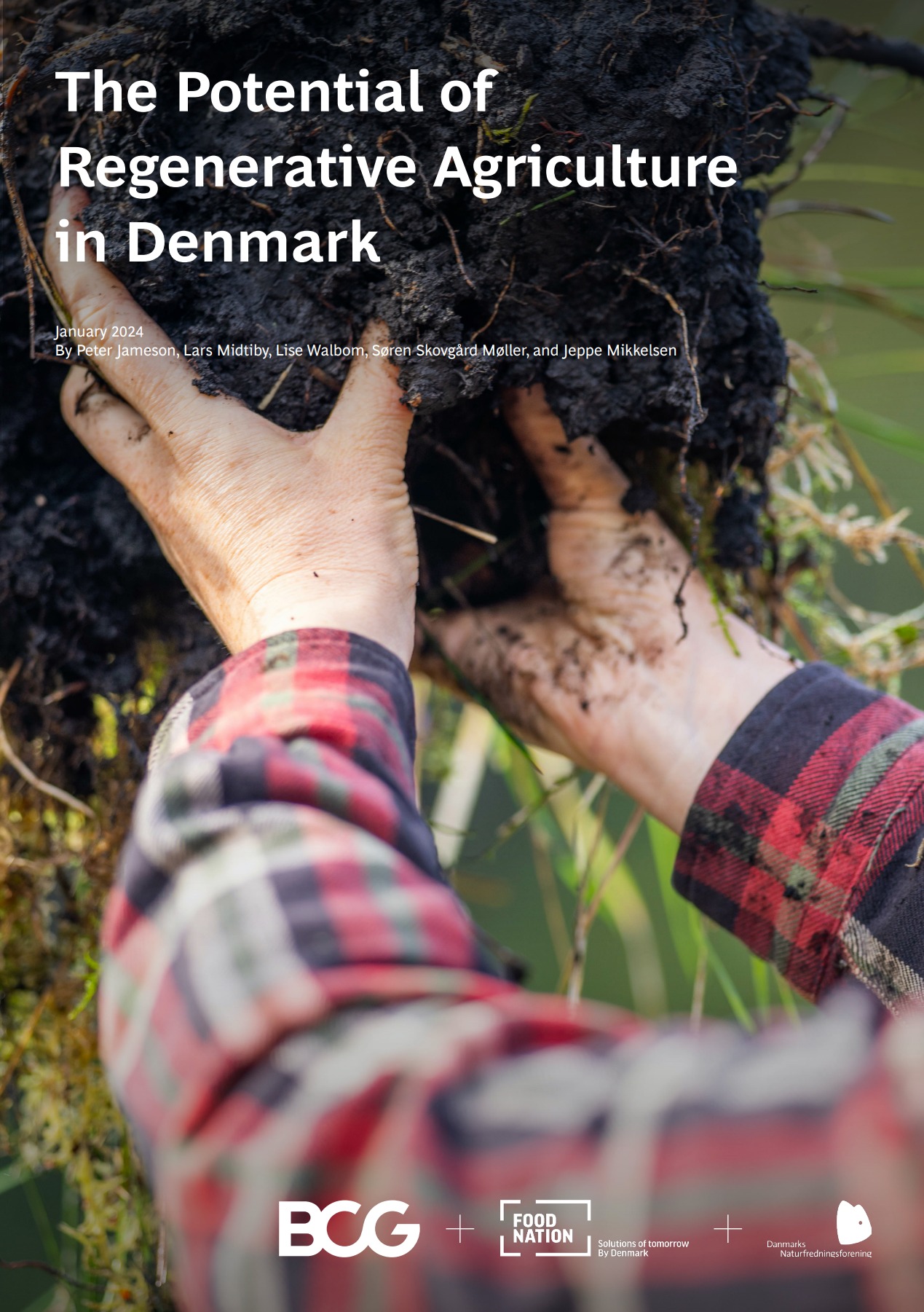New report documents the economic and environmental potentials of Regenerative Agriculture for the Danish agri-food sector
In a new report, the economic and environmental benefits of transitioning Denmark’s agricultural sector into Regenerative Agriculture are calculated for the first time. The transition, which may happen gradually, is now documented as a potentially good business case. Food Nation co-authors the report along with Boston Consulting Group and The Danish Society for Nature Conservation.
In 2022, the agri-food sector in Denmark contributed to 33% of the country’s total CO2e emissions. Given that over 60% of Denmark’s land is used as farmland, this has impact on biodiversity. In response to the challenges posed by climate change and biodiversity loss, there’s an opportunity for Danish farmers to take the lead in adopting Regenerative Agriculture. This approach to farming aims to reduce emissions, improve biodiversity, mitigate the effects of extreme weather, and positively transform the agri-food value chain.
The new report, drawing on extensive datasets, examines the economic feasibility and environmental advantages of Regenerative Agriculture. The report documents that there is a substantial potential to transform Denmark’s agricultural practices, aiming for sustainability and increased resilience. Defining Regenerative Agriculture as a collection of flexible, sustainable farming practices intended to align with natural systems, the report outlines the key goal of Regenerative Agriculture to be the restoration of soil health and surrounding ecosystems by focusing on three core principles:
- No-till farming (including direct seeding): Using no-till practices helps preserve soil structure and enhances the conservation of organic matter.
- Permanent coverage of the soil with plants: Ensuring continuous vegetation cover protects the soil from erosion, improves water retention, and supports biodiversity.
- Wider crop rotation: Implementing diverse crop rotations promotes more robust ecosystems and reduces the need for synthetic fertilizers.
The report emphasizes that the adoption of Regenerative Agriculture is a gradual process that can be implemented in three stages – basic, intermediate, and advanced – and over several years. It also acknowledges the need for flexibility, as individual farms may require different regenerative practices based on their unique climate and soil characteristics. The aim is to work in harmony with natural systems, leading to benefits such as smaller CO2e footprints, greater biodiversity, and improved water management.
The Promise of Regenerative Agriculture
Adopting a comprehensive strategy, Regenerative Agriculture seeks to align with natural processes. The different pathways outlined in the report offer a more sustainable future – also economically. Here are some of the main environmental and economic benefits for farmers which are documented in the report:
The Economic Case for Farmers: Regenerative Agriculture not only proves economically viable but potentially lucrative for farmers. An in-depth analysis focusing on major Danish crops reveals that completing even just basic levels of adaptation to regenerative practices could boost contribution margins by 20%. No-till practices and cover cropping further contribute to increased profitability, though challenges like soil balancing tests are acknowledged.
A Collective Benefit for the Agri-Food System: The positive impacts of Regenerative Agriculture extend beyond the farm gates, encompassing the entire agri-food system. Downstream players—food producers, distributors, retailers, and consumers—stand to gain. Financial, socio-ecological, and reputational incentives create a compelling business case for embracing sustainability.
Environmental Benefits: Amongst several advantages of Regenerative Agriculture a smaller carbon footprint is one of the key outcomes, which, amongst others, is achieved through reduced use of farming machinery and synthetic fertilizers. By improving soil health, carbon sequestration is enhanced, contributing significantly to mitigating climate change. The practices also promote biodiversity, creating healthier ecosystems both above and below the ground.
Water Management and Beyond: Regenerative Agriculture addresses water-related challenges by reducing the need for synthetic fertilizers, minimizing water pollution, and averting coastal eutrophication. The improved soil structure enhances water retention, reducing the reliance on irrigation and mitigating the impact of droughts on yields. The benefits extend beyond the farm, creating a ripple effect that positively influences the entire ecosystem.
Access the report

View or download the report here:
https://www.bcg.com/publications/2024/potential-of-regenerative-agriculture-in-denmark

